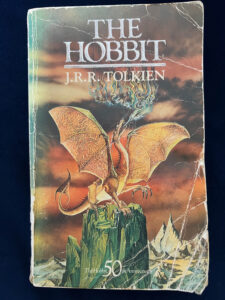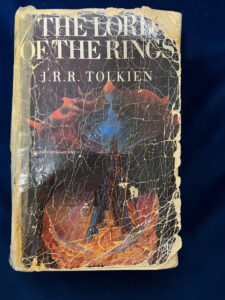Have you read it?
As far as we know, there’s no actual law requiring any fantasy writer to read The Lord of The Rings but, equally, there is no law against it. Tolkien’s finest piece of work has achieved a level of cultural awareness belying the fact that, when first released, few if any people were creating stuff like that. Lord Dunsany isn’t a straight predecessor to his work. Nor is it the case that The Hobbit begat The Lord of The Rings which has its routes in world-building and earlier stories, published later but written much earlier than either text. Middle-earth started decades earlier, in the trenches of World War One and the hospital beds from which Tolkien transited back and forth during that horrific conflict.
All of this was before I was born.
I came into contact with Tolkien’s work sometime after he had passed away. In Harrow, in a bookshop (Dillon’s, I think), where the fiftieth-anniversary edition of The Hobbit had just come out, it was 1987, and this was the first book my father bought me. It was among the first I read on my own. I adored it.
Bilbo was small, scared, and lost in a big world where eventually he found the courage to do what needed to be done. That it resonated with a kid who moved every few years during the 80s, similarly smaller than many of his peers and scared by just about everything, shouldn’t be a huge surprise. The book has travelled with me ever since and that copy still sits on my shelf to this day. That was the entry drug. The main hit was coming.
 Christmas, 1990. I was eleven. Amongst the gifts under the tree was a massive book-shaped object that, on unwrapping, was the biggest book I had ever seen in my life (at that age). An omnibus edition of The Lord of The Rings from my Great Uncle Keith. I started it that day, retiring to my room, and emerging several days later having devoured it. During that epic binge read – I munched through all my Christmas chocolate and raided the cupboards for supplies, imagining that I was on the road with the fellowship as I read. I was blown away.
Christmas, 1990. I was eleven. Amongst the gifts under the tree was a massive book-shaped object that, on unwrapping, was the biggest book I had ever seen in my life (at that age). An omnibus edition of The Lord of The Rings from my Great Uncle Keith. I started it that day, retiring to my room, and emerging several days later having devoured it. During that epic binge read – I munched through all my Christmas chocolate and raided the cupboards for supplies, imagining that I was on the road with the fellowship as I read. I was blown away.
When I finished, I read it again. Right away.
For the longest time, right into my thirties, I would read the book once a year or so and travel the road once more. I stopped in 2013. I have picked it up again in recent weeks and the pull of the story is no less. People ask me why I reread it but, truthfully, I have always reread books I like and, often, I take something new from the stories. In the case of The Lord of The Rings, with such a rich tapestry, there is so much there that this is particularly true.
When I was younger, I used to think of the story as a ripping yarn, but as I came to know more about Tolkien, I saw it more as an intellectual experiment from a gifted language enthusiast. Now? Well, now I see it as a love letter to a slice of Britain, from a particular period in time, that I doubt very much ever really existed outside of the emerging middle class. Does that lessen it? No. The dangers of mechanization and war run through the story like a dark ribbon of coal through rock and for a man who fought in WWI and saw his children fight in WWII this is not surprising. Underneath though is the subversion of class in Sam who on one level can be perceived throughout as being subservient to Frodo but, if you dig deeper, can be seen as the actual hero of the book. It is Sam who carries Frodo through, Sam who transcends his station and takes on Bag End when Frodo travels west, and it is Sam who carries the ring without succumbing as Bilbo and Frodo did. Indeed, this view was what drove Elijah Wood and Sean Astin’s performances in the film adaption.
The book is full of contradictions much like Tolkien himself. On the one hand, women are often portrayed as mysterious and somewhat lacking in agency and on the other hand you have Eowyn, a fierce warrior, holding an unrequited torch for Aragorn, who is destined to kill the most physical manifestation of Sauron’s power. This conceit is entirely at odds with Tolkien’s background and period. It’s progressive and subversive. Yet women are entirely absent from The Hobbit and somewhat indistinctly drawn and on the periphery of The Lord of The Rings. Tolkien’s own attitudes to women were decidedly mixed and patriarchal.
The world of Middle-earth eschews true allegory, Tolkien loathed it, but there is at once the author who stood up to Hitler and fascism in a clear and brilliant letter to a would-be German publisher and the fact that race does determine character in Middle Earth. Yet. It is not as clear cut as that because you have the European-drawn men behaving with ill intent from Saruman to the Nazgul, dwarves such as Gimli that reach beyond the deeply problematic tropes Tolkien gave them and so on. The Lord of The Rings is complicated. Frodo ultimately fails. Aragorn is a reluctant king who nearly forgoes his destiny. Gandalf and Galadriel wrestle with temptation throughout. Even Sauron did not start as evil in that universe. Middle Earth is complicated much like the real world and that is perhaps where its enduring charm lies.
Equally, the relationship between the male characters, who show a deep affection for each other, openly and without any sense of English stiff upper lip. This truth that on the face of it runs so counter to the perceived behaviour of the period that some will disagree with my perspective and argue it is Tolkien reflecting an earlier chivalrous ideal. Personally, I think this is a by-product of an orphan for whom his school friendships – most of whom died in the fields of France – were surrogate brothers that kept him sane through boarding school. Again and again, echoes of the world through which Tolkien moved creep into the text, and perhaps the most clearly wrought observation can be taken from the quote I refer back to with more and more regularity:
‘I wish it need not have happened in my time,’ said Frodo.
‘So do I,’ said Gandalf, ‘and so do all who live to see such times. But that is not for them to decide. All we have to decide is what to do with the time that is given us.’
The Fellowship of The Ring, J.R.R.Tolkien.
The impact of the book on me was sudden and complete. I had known I wanted to be a writer since I first saw an interview with Roald Dahl, where it became apparent to me that writers were not some obscure name, long since dead, and that you could do it too. I didn’t know what type of writer I wanted to be. Once I read The Lord of The Rings, like many writers before and after me, I knew I wanted to write fantasy. Indeed, for a while there, I was going to become a professor too. Common sense prevailed – I really would look like a hobbit if I wore tweed.
As I said, it’s unlikely you’ve not read TLOTR but if you haven’t then it’s likely much of the language and concepts have entered your awareness. The film adaptions – now hard to imagine not here – were considered somewhat impossible to film for the longest time and still hold up pretty well today. Unlike the criminal adaption of The Hobbit, TLOTR was unabashedly popular bringing the story to the masses much like Star Wars had with science fiction decades before. However, even before that, Tolkien had influenced rock musicians, other writers and 60s counter-culture. Something he arguably regretted.
Without Tolkien, there’s no Wheel of Time; no Fionavar Tapestry; no Thomas Covenant; no Rhincewind, and probably no Discworld, certainly no Dark Tower series – you could make a case IT would not exist too – and the list goes on. Led Zeppelin sounds very different in a non-Tolkien reality. The other Neil, of the second generation to grow up with the books, can be seen talking about this influence elsewhere (discovered after the early draft of this post was done). The reason I highlight this is even with fantasy writers who arguably draw their influences more obviously from the likes of Peake, Dunsany, and Mirrlees – Tolkien is there in the background.
There are often not that many books in a lifetime that leave an indelible mark on you. For me, TLOTR was one.
What were yours?
